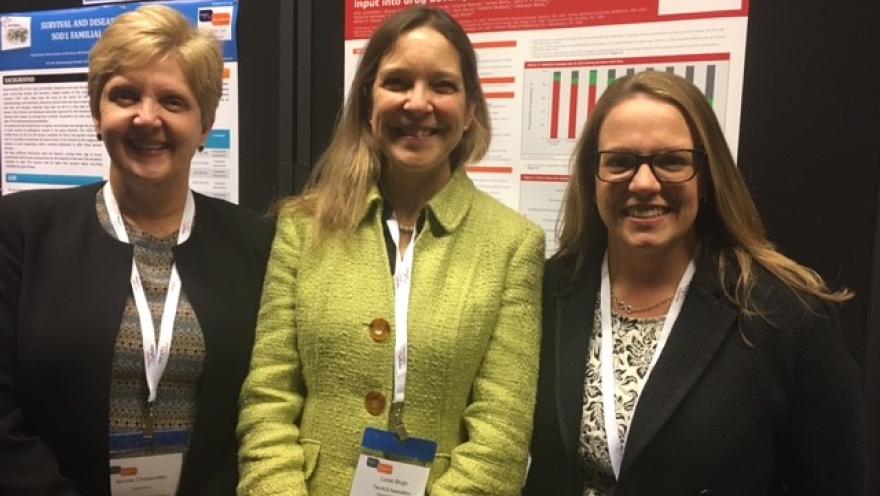Update, January 4, 2019: The ALS PREFER program is now called ALS Focus. The article text has been changed to reflect that.
The number of ongoing ALS clinical trials has risen in recent years due to increased awareness and funding of this devastating disease. Consequently, it is more important than ever to integrate people with ALS and their caregivers into the drug development process and to gather their crucial input about ALS burden. Due to these trends, a platform initiative for patient engagement in drug development, called ALS Focus, was developed and initiated by a collaboration between The ALS Association and top ALS researchers across the country.
The first step was to initiate the IMPACT ALS survey to gather information regarding perspectives of people with ALS and their caregivers as it relates to disease burden, functional outcomes, and views on treatments. Read more to learn about IMPACT ALS and its important results.
Background
The goal of ALS Focus is to bring patient input into the center of ALS drug development to achieve a visible impact on clinical design, regulatory review, payment, and policy decisions, all considering people with ALS and caregiver preferences. Ultimately, we hope to increase engagement in clinical trials and ensure positive trials produce results that are meaningful to the ALS community.
From this vision, the IMPACT ALS survey initiative was designed to expand available data for people with ALS and caregiver perspectives, to guide drug development practices. The survey was developed by a diverse group including members from The ALS Association, Cytokinetics, Biogen, Ionis Pharmaceuticals, regulatory experts, ALS clinical thought leaders, and, most importantly, a person living with ALS and a caregiver.
People with ALS, people assisting people with ALS, and current and past caregivers were asked to participate. Recruitment for the survey was conducted online through social media and email campaigns, at meetings, and at clinical sites, including ALS Association clinics. Members at the Northeast ALS (NEALS) Consortium, CReATe network, and the Centers for Disease Control Agency for Toxic Substances and Disease Registry (CDC ATSDR) through the National ALS Registry all took part in promoting the survey.
The survey
IMPACT ALS was comprised of the following five modules: disease background, living with ALS, approaches to treating ALS, demographics, and caregiver-specific burden of disease. It was completely anonymous and was conducted online with Survey Gizmo over a 3-week period
Results
Overall, we achieved high participation with 1,534 people filling out the IMPACT ALS survey, although not everyone responded to all modules. Of that, 813 were people with ALS, 74 were people assisting a person with ALS, and 647 were caregivers. People with ALS were represented from every state in the U.S., with representation across states comparable to the portion of the U.S. population in each state.
Of those who reported disease characteristics for people with ALS, 71 percent had sporadic ALS, 28 percent had their first symptom more than 5 years ago, 20 percent had their formal diagnosis more than 5 years ago, 13 percent had passed away, and the average ALSFRS-R score reported by 242 participants was 32.
These results represent an observed cross section of people with ALS and their burden of disease, as well as caregivers and their own burden.
Participants reported that:
- The symptom burden of ALS was high
- The most common stress burden of ALS was moderate
- The effect of ALS on independence was high; greater than one third of persons with ALS experienced difficulty with 10 out of 10 activities of daily living
- Persons with ALS had notable decreases in time spent doing lifestyle-related activities due to ALS
- The majority of people with ALS had fears about the future, most notably of leaving their family too soon
- The top identified preferred outcomes of a future treatment were stop the progression of ALS, and improvements in breathing/respiratory function, muscle weakness, and mobility
More detailed results will be reported soon, as a deeper analysis is ongoing.
Future Directions
- These experiences of persons with ALS and their caregivers will help inform drug development
- This information will also set the context for regulatory decision-making by the U.S. Food and Drug Administration by establishing the burdens of ALS in daily life and the unmet medical needs of the community
- Future analyses will compare caregiver versus patient perspectives on the ALS burden of disease
- Future surveys will capture patient experiences abroad to ensure the voice of individuals with ALS and their caregivers can inform global drug development
Thank you to everyone who took their time and energy to complete the survey. Your participation is imperative to our success! Thank you to all our partners for all their hard work with ALS Focus and the IMPACT ALS survey. We look forward to our continued collaboration to keep moving this important initiative forward.
Citation
This information was presented at the 28th International Symposium on ALS/MND on December 9, 2017 in Boston, Mass.
Poster CLT-03: People living with ALS and their caregiver's input into drug development
Amy Laverdiere1; Bonnie Charpentier1; Jennifer Petrillo2; Kristina Bowyer3; James Berry4; John Bridges5; Madeline Kennedy6; Brian Kennedy6; Zachary Simmons7; John Ravits8; Richard Bedlack9; Calaneet Balas10; Allison Durham11; David Zook11; James E. Valentine12; Lucie Brujin10
1Cytokinetics, South San Francisco, CA, USA; 2Biogen, Boston, MA, USA; 3Ionis, Carlsbad, CA, USA; 4Massachusetts General Hospital, Boston, MA, USA; 5Johns Hopkins University, Baltimore, MD, USA; 6Bonita Springs, FL, USA; 7Penn State Hershey Neuroscience Clinic, Hershey, PA, USA; 8University of California San Diego, San Diego, CA, USA; 9Duke University, Durham, NC, USA; 10The ALS Association, Washington, DC, USA; 11Fagre Baker Daniels, Washington, DC, USA; 12Hyman, Phelps & McNamara, P.C., Washington, DC, USA
Acknowledgments
Medical writing and editorial assistance was provided by ApotheCom (San Francisco, CA) and was funded by The ALS Association.


Join the conversation. Please comment below.